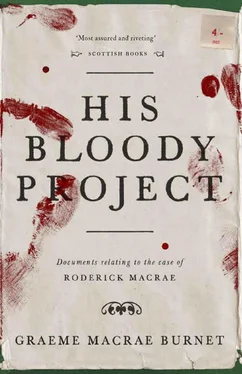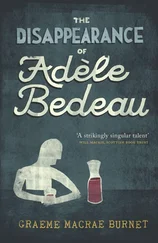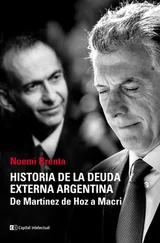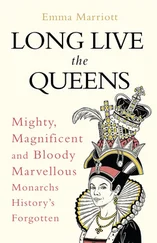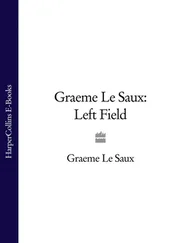He began by asking about the witness’s relationship with the deceased. Mr Macrae appeared confused by the questions put to him and there were murmurs of amusement in the gallery, which were quickly curbed by the bench. Mr Gifford then re-phrased his question, all this, on account of the translation process, taking a good deal of time: ‘Were you and Mr Mackenzie on friendly terms?’
Mr Macrae: ‘I know a good number of Mackenzies.’
Mr Gifford smiled patiently. ‘I am referring to your neighbour, Lachlan Mackenzie, or Lachlan Broad, as he was known.’
‘Ah, yes,’ said Mr Macrae. This response brought a fresh outburst of laughter from the gallery. The judge then ordered that the macers eject one of the culprits, an act which, despite the disruption it caused, appeared to have the desired effect.
Mr Gifford then repeated his question.
‘I would not say that we were friends,’ replied Mr Macrae.
‘Why was that?’
‘I could not say.’
‘Was there any reason that you and Lachlan Mackenzie were not friends?’
Mr Macrae made no reply. The Lord Justice-Clerk then asked, through the translator, if Mr Macrae was having difficulty understanding the advocate’s questions. Then, having received assurance that he was not, reminded the witness that he was required to answer the questions put to him or be held in contempt.
Mr Gifford then asked Mr Macrae about the reduction of the croft. After a laborious series of questions regarding this incident, he asked, ‘Did you feel aggrieved about this settlement?’
‘No.’
‘You were not aggrieved that a portion of your croft, from which you derived the food to feed your family, had been taken from you?’
‘There were others who had greater need of the land.’
‘Did your son feel aggrieved about this settlement?’
‘You would have to ask him yourself.’
‘Did he show any sign of being aggrieved about this settlement?’
No reply.
‘Did you discuss this incident with your son?’
‘No.’
Mr Gifford appear somewhat exasperated and appealed to the Lord Justice-Clerk to compel the witness to answer his questions more fully. The judge replied that it was for the gentlemen of the jury to decide whether the answers given were satisfactory.
The Solicitor-General then moved to an incident which had not yet been introduced.
‘Do you recall,’ he asked, ‘a morning sometime in April or May this year when you were gathering sea-ware on the shore at Culduie?’
‘I do.’
‘Can you tell the court what occurred that morning?’
‘It is as you say,’ Mr Macrae replied, to stifled laughter from the gallery.
‘You were gathering sea-ware?’
‘Yes.’
‘With your son?’
‘Yes.’
‘For what purpose were you gathering this sea-ware?’
‘For the purpose of spreading on the croft.’
‘Did you speak to Mr Mackenzie that morning?’
‘He spoke to me.’
‘And what did he say?’
‘He told me to return the sea-ware we had gathered to the shore.’
‘Did he give any reason for his instruction?’
‘We had not the permission to remove it.’
‘You require permission to remove sea-ware from the shore?’
‘It seems so.’
‘Whose permission did you require?’
‘The permission of Lord Middleton, to whom the sea-ware belonged.’
‘Lord Middleton being the laird of your district?’
‘Yes.’
‘Had you gathered sea-ware from the shore before?’
‘Yes.’
‘Frequently?’
‘On a yearly basis.’
‘And had you sought permission to do so on these previous occasions?’
‘No.’
‘But on this occasion Mr Mackenzie asked you to return the sea-ware you had gathered?’
‘Yes.’
‘Why do you think he did so?’
‘It was his role to enforce the regulations.’
‘And you accepted that?’
‘Yes.’
‘You did not feel aggrieved at Mr Mackenzie’s actions?’
Mr Macrae made no answer.
‘You were compelled to return a large quantity of sea-ware, which you had spent some hours harvesting, this in accordance with long-established practice, yet you did not feel aggrieved?’
The crofter looked at the advocate for a few moments, then replied, ‘I was not happy about it.’
Mr Gifford here exhaled theatrically, and was reprimanded by the Lord Justice-Clerk for doing so. He then excused himself, but was unable to resist a meaningful look towards the jury.
‘And is it true,’ he continued, ‘that on the following day, the village in its entirety gathered sea-ware for the purpose of spreading on their crofts?’
‘I do not know what their purpose was.’
‘But they gathered sea-ware?’
‘Yes.’
‘And you did not?’
‘No.’
‘Can you say why they were allowed to gather sea-ware and you were not?’
‘They had permission to do so.’
‘And you did not seek permission to join them?’
‘I did not wish to take what did not belong to me.’
There was some laughter in the gallery. Mr Macrae kept his eyes fixed on his left hand, which was gripping the edge of the witness box. Mr Gifford allowed a few moments to pass before proceeding.
‘So, if I may summarise,’ he said, ‘your testimony is that you bore no grievance towards the deceased, a man who had reduced the size of your croft, who had ordered you to return sea-ware to the shore, and to whom, on account of the incident with the sheep, you were indebted a considerable amount?’
Mr Macrae made no answer.
Mr Gifford pressed him for an answer.
‘It was not for me to hold a grievance towards Mr Mackenzie.’
The Lord Justice-Clerk at this point reminded Mr Gifford that it was not the witness that was on trial, and the question of whether he bore a grievance towards the deceased was immaterial. It was clearly important to the Crown’s strategy, however, that in order to prove the defendant had acted rationally, it was necessary to establish the existence of a grievance against the victim. It was thus a visibly infuriated Mr Gifford that concluded his questioning. A gleeful sketch in the following day’s Inverness Courier described how the ‘Crown’s finest legal mind had been bested by a simple crofter’.
Mr Sinclair rose for the defence and, addressing the witness in Gaelic, enquired whether he was quite comfortable.
‘Now,’ he said, ‘I must ask you about your son, who is here accused of the most dreadful crimes. Prior to the events which have brought us to this court-room, did you ever know your son to be violent?’
Mr Macrae made no answer.
‘Did your son ever strike you or threaten to strike you?’
Mr Macrae made no answer and was reminded by the Lord Justice-Clerk of his obligations.
‘No.’
‘Did he ever strike your wife or any of his siblings?’
‘No.’
‘Did he ever strike any of your neighbours?’
‘No.’
‘So you would not say that he was given to violence?’
‘No.’
‘So if he committed these acts of which he is here charged, you would say that it was out of character?’
Mr Macrae did not seem to understand this question.
Mr Sinclair: ‘Would you describe your son as a violent person?’
‘I have never had cause to describe him.’
Mr Sinclair smiled, in ‘a clear attempt to conceal his growing irritation’, and rephrased his question: ‘If you were asked to describe your son, would you describe him as a violent person?’
‘I don’t believe so,’ the witness replied.
‘Were you ever violent towards your son?’
‘I was not.’
‘You never struck him?’
‘I did strike him.’
‘When did you have occasion to strike him?’
Читать дальше
